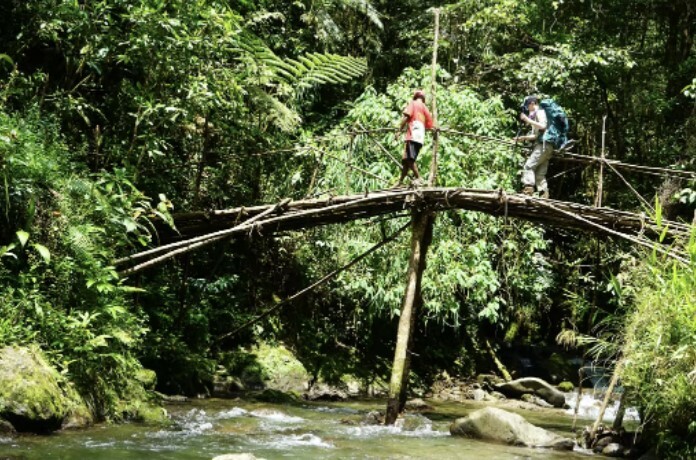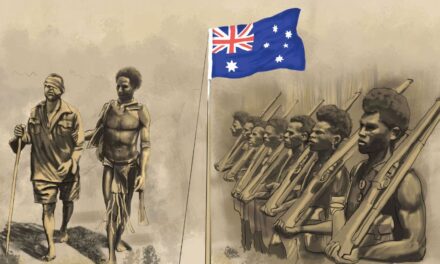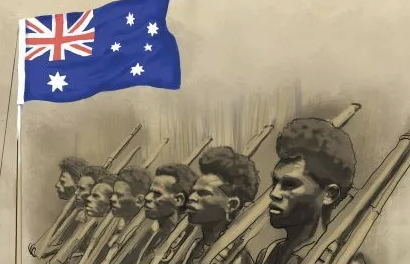In 2008 Australia developed a ‘Joint’ Agreement with the PNG Government in regard to the management of the Kokoda Trail and its surrounding environs. The lead agency was the Department of Environment, Water, Heritage and the Arts (later rebadged as the Department of Sustainability, Environment, Water, Population and Communities) and more recently as the Department of Environment.
The agreement provided a gateway for envirocrats within the department to pursue their ideological objectives in regard to climate change. The wartime significance of the Kokoda campaign did not rate a mention. The ‘Joint’ part of the agreement would undoubtedly have included an appropriate amount of ‘Aid’ funding as an inducement for PNG to sign.
The objective was ostensibly to ‘assist’ PNG to establish a case for a World Heritage Listing for the Owen Stanley Ranges – a noble objective to those who have experienced the pristine environment, majestic landscapes and cultural diversity of the land of the unexpected.
The Kokoda Trail, a series of tracks between Owers Corner and Kokoda, was soon redefined as the ‘Kokoda Track Region’ to include the Sogeri Plateau, the Sirinumu Dam, the ‘Brown River Catchment Area’ and the beachheads of Buna and Gona – almost a ‘Province’ in its own right.
The expanded definition created the second gold rush across the Kokoda Trail. The first was the discovery of the precious metal in the Yodda Valley in 1899. Unlike the first gold rush which had a finite ending after it had been extracted this one just keeps on giving. The new gold is ‘enviro-consultancy’ and its infinite seam has been labelled ‘AusAID’ with a myriad of mutations.
The rush started under the Coalition Government in 2006 after a threat to mine part of the Kokoda Trail awakened them to a likely backlash from voters who do give a damn about our military history. For reasons known only to them they allocated responsibility to the Department of Environment rather that the Department of Veterans Affairs. This could have been motivated by the fact that Veterans Affairs was allocated to dud Ministers during the Howard era while Environment was run by an ambitious and brash young Malcolm Turnbull.
Pioneers of the Kokoda trekking industry who were striving for the protection of the military heritage of the Kokoda campaign were soon swept aside as bureaucrats, envirocrats and consultants swarmed into PNG. They were attracted by the honey of bloated salaries and generous tax-free allowances for the ‘dangers’ they would have to endure. Walking down the steps of the Port Moresby Yacht Club after a boozy session discussing the limitations of Papua New Guineans can be quite a hazardous exercise!
Until the arrival of the ‘Canberra Cavalry,’ the Kokoda Trail had been managed by one person, Warren Bartlett, a former PNG Patrol Officer (who were known as ‘Kiaps’) with a part-time secretary. This was a good indication of the level of interest and support from successive Australian governments since the end of the war in 1945. During Bartlett’s tenure trekker numbers increased 255 per cent from 1584 in 2004 to 5621 in 2008. Under his stewardship campsites along the trail were developed; village workshops were conducted; newsletters were published on a monthly basis while he had to manage a ‘PNG Board’ that misappropriated more than $1 million in ways we will never understand. The figure would have been quadrupled had it not been for Bartlett’s understanding of the ‘Melanesian Way’ and his meticulous accounting – the hallmark of former ‘kiaps’.
All this counted for naught when the ‘Canberra Cavalry’ arrived. Staff numbers were increased 10 fold; bureaucratic talkfests were introduced; village workshops were dispensed with (what would subsistence natives know about what’s good for them?); the budget was increased from nothing to $50 million, and pioneering trek operators were sidelined so the natives could be protected from their exploitation. Never mind the fact that they were the only providers of village support before the cavalry arrived – and they provided it from their own wallets.
The results speak for themselves.
Since the Canberra cavalry assumed control of the Kokoda trekking industry in 2009 trekker numbers have declined by 46 per cent. The $3 million ‘Village Livelihoods Project’, conceived in Canberra without any consultation with relevant PNG authorities has not produced a single vegetable out of the ground or generated a single dollar in additional income for local villagers. One of the villages they invested much ‘talkfest’ capital’ in is now deserted.
- Of the five strategies and 33 Key Performance objectives they set for their Strategic Plan: 2012-2015, not one has been achieved.
- Toilets along the trail are now so putrid that female trekkers are often heard dry-retching when they have to us them.
- After eight years in-situ not a single management protocol is in place for the Kokoda trekking industry and, as a result, trekker numbers continue to decline.
The only conclusion to be drawn from these facts is that it was designed to fail so as to minimise the impact of Australians treading on plants along the Kokoda Trail. If that is not the case then it will stand as one of the great examples of cultural ignorance and managerial incompetence of the modern era in our relationship with PNG.
The reaction of the bureaucrats, envirocrats and academic consultants on the aid funded drip has been to switch their emphasis to intangible social causes such as capacity building, gender equity studies, social mapping and other non-measurable and non-accountable bureaucratic hobby-horses.
If the salaries of Australian aid funded bureaucrats and envirocrats were tied to social and economic outcomes along the Kokoda Trail since 2009 most would have to borrow money for their return flight at the end of their taxpayer funded tenures!
The really sad thing is that since the election of the Coalition Government in 2012 nothing has changed. The same horse has just been saddled with a new jockey and as my old English sergeant-major would often say ‘it’s enough to make a shepherd want to throw down his crook and f–k his flock!’

Vietnam Veteran Charlie Lynn retired as a major from the Australian Army after 21 years’ service. He later served in the NSW Parliament for almost 20 years. A veteran of 84 Kokoda Trail crossings he was inducted as an Officer of the Order of Logohu in the 2015 PNG New Year’s Honours List.





